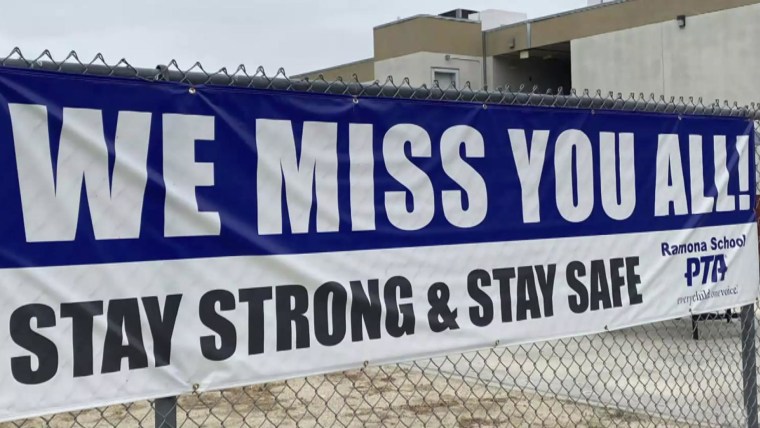WASHINGTON — As the calls from the White House to fully reopen schools grow louder, evidence continues to pile up to show that scenario is unlikely to happen, at least not on the national scale President Donald Trump desires. That’s not because state and local officials aren’t trying, but because the spread of the virus is beginning to overwhelm even the best-laid plans.
Dallas Independent School District Superintendent Michael Hinojosa, for example, had been working on a blueprint to reopen schools in August as part of a long and delicate process. But with the virus now surging across Texas, the outbreak may make the decision for him.
“Initially I thought we would be ready, but I’m starting to have second thoughts,” Hinojosa told MSNBC’s Garret Haake last week. “Our parents have pivoted, more than 50 percent of them are now saying they don’t want to come, and we’re hearing loud and clear from our employees, especially our teachers, that they have a lot of concerns about how we can pull this off.”
His experience could be a preview of what’s to come for many school districts.
Public health experts, school officials, and teacher unions are warning that any proposal to physically reopen likely depends on containing the broader spread of the virus outside the classroom.
“I think it does become hard or impossible in areas with very high rates of infection,” Joshua Sharfstein, Vice Dean for Public Health Practice and Community Engagement at Johns Hopkins University and an advocate for reopening schools, said. “People will just be getting sick in the community and bringing it into the school. It will be very disruptive to the ability to stay open.”
Full coverage of the coronavirus outbreak
With cases rising rapidly in much of the country, even states and districts with the most well-crafted and aggressive reopening plans could be whistling past the empty schoolyard if that’s the case.
San Diego, which was planning to open five days a week, announced on Monday it would only offer online learning thanks to the recent rise in coronavirus cases. Los Angeles will do the same.
Officials in Nashville and Atlanta have also announced the school year will start online due to their own coronavirus surges. Virginia Governor Ralph Northam has warned that school districts, some of which are already adopting hybrid plans, will not reopen if the state can’t keep infections down.
This presents obstacles to President Trump’s late scramble to open up schools, which he’s so far pursued by demanding that the Centers for Disease Control scale back its safety guidelines and by threatening schools that don’t open with some kind of financial punishment.
Even as Texas state officials move forward with a plan to require all schools to reopen full-time, for example, Governor Greg Abbott has cautioned that “if we continue to see COVID spreading the way that it is right now, it may be necessary to employ that flexibility and use online learning.” State guidance materials caution schools to design plans for “intermittent closure” if outbreaks occur.
The CDC offers some guidance to schools on how to isolate students or staff if they fall ill, but if parents pull their kids out of class in large numbers in favor of a remote learning option, that could effectively quash reopenings even if they continue on paper.
Both the worsening pandemic and Trump’s demands threaten to accelerate the trend by increasing anxiety about health conditions in schools. In Texas, a poll in June by the University of Texas/Texas Politics Project found 65 percent of respondents still considered schools “unsafe” for students.
“For me the goal is not just to open, it’s to stay open,” Dr. Thomas Frieden, a former CDC director, said on MSNBC. “If we open for a week or two and have to shut down the nation again, that would be a much worse travesty for our nation’s young children.”
Keeping teachers on board with reopening amid a raging series of outbreaks is also likely to be a struggle. American Federation of Teachers president Randi Weingarten has warned of a potential exodus of teachers retiring, quitting, or taking leave if they decide conditions are unsafe.
Some officials affiliated with the Trump administration have notably hedged their calls for reopening with disclaimers that pushing down cases is a critical step.
“The first thing we need to do is we need to get the virus under control,” White House testing czar Admiral Brett Giroir, who has advocated for reopening schools, said on ABC News on Sunday. “When we get the virus more under control, then we can really think about how we put children back in the classroom.”
While the White House has not presented a clear alternative to CDC guidelines or committed to funding new safety measures, plenty of outside health officials have argued that physically reopening schools should be the nation’s top priority given the immense strain even partial closures put on families.
Experts have proposed an array of potential measures to get there, from isolating groups of students to prevent large outbreaks, to installing partitions around desks, to pooling staff tests to detect infections early, to hiring aides to back up teachers.
Download the NBC News app for full coverage of the coronavirus outbreak
The White House has frequently cited recommendations by the American Academy of Pediatrics, for example, to attempt 5-day-a-week reopenings in schools.
But the AAP, seemingly alarmed by Trump’s approach, issued a joint statement with national teachers unions and the School Superintendents Association on Friday warning that any approach to schools needed to follow public health guidance and get buy-in from local parents and teachers.
Critically, they warned that reopening plans should be scrapped if the outbreak becomes too severe.
“Schools in areas with high levels of COVID-19 community spread should not be compelled to reopen against the judgment of local experts,” they wrote.












